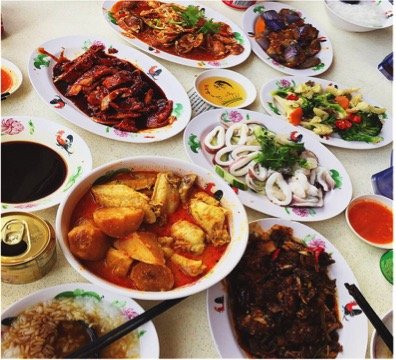
Comfort Food for Early Risers and Late‑Night Partiers

Comfort Food for Early Risers and Late‑Night Partiers
Teochew porridge in Singapore
I was seated at a local kopitiam (coffee shop) in a slightly questionable neighborhood. It has the requisite tissue-strewn greasy floor tiles, and the jarring crackle of once chart-topping mandopop hits blasts in the background. I’m sitting under the vulgar protrusion of flickering fluorescence that is its signboard, once upon a time serving to differentiate the shop from its rivals down the street, now serving merely to allude passers-by to its dwindling existence.
My watch reads 3 am. A group of six saunter in, fresh from a night of drunken revelry at the nearby clubs. The men are middle-aged, jaded. The ladies are supplying forced laughter and faked flattery, and are wearing revealing party dresses as fleshy as they are flashy. They take their place on flimsy plastic stools, ordering up a second, maybe third, round of drinks. The chosen one of the group ambles to the counter, shouting out orders like a seasoned professional, without stopping to look at what’s on display. Perhaps everything looks alike with beer goggles on.
To them, this is supper. A reward for their work on the dance floor, fuel for further shenanigans. The night is still young.
My watch reads 3:30 am. A frail, elderly man in a cleaner’s uniform takes his seat in a corner, observing the earlier group over the rim of his kopi mug. He waits for the group to finish ordering before hobbling up to inspect the offerings on display, estimating the cost of different permutations of dishes and whether it fits within his limited budget. After settling on his optimal combination, he points to indicate his choices, ordering without a word.
To him, this is breakfast. A necessity to last through the long day ahead, fuel to grind through his double shift washing toilets at the nearby 24-hour shopping mall. The day’s just begun.
The selected dishes arrive, ranging from the simple—boiled peanuts, salted duck eggs, stir-fried greens—to the more elaborate—plump steamed squid, chilli smothered clams, fatty meats stewed for hours on end, and braised tofu—all accompanied by steaming, piping bowls of plain porridge. Much has been said about comfort food being a great equalizer, and just for a moment, I could see the food in question, teochew porridge, as just that. The moment the thud of bowls on tables signals the arrival of the food, everyone in the kopitiam—no matter his or her financial situation, state of mind, or lot in life—halts all conversation, and just for that moment, everyone focuses instead on executing the scoop-soup-slurp-burp process of consuming teochew porridge, exhaling in quiet satisfaction with the repeat of each cycle.
It is a dish of juxtapositions. On one hand, you have over-boiled rice. Plain, bland, and oft described by locals as “sick people food.” However, any semblance of the ordinary is instantly dispelled by the accompanying dishes, often liberally spiced, heavily oiled, lavishly salted, or intensely pickled. Not to forget the imperative condiments, taucheo (fermented soybeans) and a potent blend of vinegar, garlic, and pounded chillis. Teochew porridge excites, but at the same time, it comforts.
The elderly man downs his last scoop of porridge water and lets out a soft sigh, acknowledging the long day ahead. He takes one more furtive look at the group of six, now finished with their meal, before shuffling out of his seat and onto the dimly lit street.